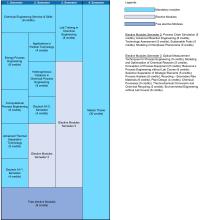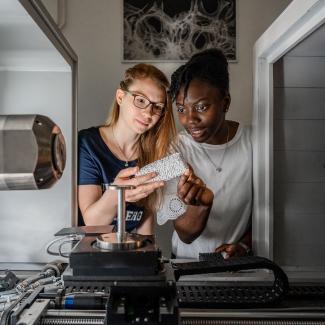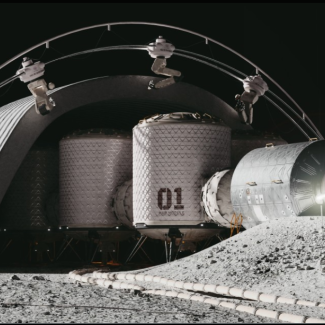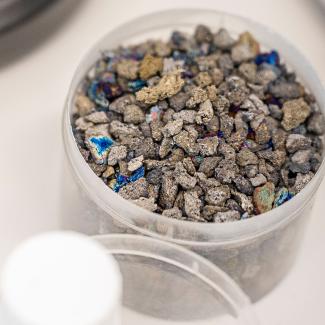Chemical Engineering
The Master's degree programme in Chemical Engineering (MCE) is a purely English-language programme and lasts four semesters from the start to the completion of the Master's thesis. It is aimed in particular at foreign graduates who wish to continue their professional career in responsible positions in industry or science, preferably in Germany, after completing their Master's degree.
Application process step by step
During the programme, you must earn 120 credit points (CPs), of which 30 CPs are allocated to the Master's thesis and 55 CPs to ten compulsory modules. For the remaining 35 CP, you can choose between two categories, the compulsory elective modules and the free elective modules. Information on the modules can be found in the curriculum and in the examination and study regulations.
In the category of compulsory elective modules, you must earn 29 CPs. Here you can choose from a portfolio of at least 16 elective modules according to your interests. With the free elective modules, you are completely free to choose from all the modules offered at TUBAF. Thanks to the wide selection in the two compulsory elective categories, you can take many modules from one area of chemical engineering if you want to specialise in one discipline, or spread the modules across the various disciplines of chemical engineering if you want a broad education.
The ten compulsory modules have been carefully selected to ensure you are qualified to take on responsible positions in German industry or academia. They include modules that will teach you the German language, modules that will familiarise you with German and Saxon companies and their organisational structure, modules that will challenge your practical skills in hands-on laboratory/pilot plant work and modules that will provide essential process engineering knowledge at Master's level. The MCE programme does NOT teach science and engineering fundamentals and process engineering fundamentals at Bachelor level. They are assumed and the scientific training of future graduates on the MCE programme builds on them.
Chemical engineering (abbreviated to "ChemEng") deals with all processes in which substances are changed in their composition, type or properties by mechanical, thermal, chemical or biological processes. The electronic materials in your mobile phone, tablet, laptop or PC were obtained from raw materials with the help of ChemEng. The plastics, paints, coatings and foams that surround you were produced from chemical raw materials with the help of ChemEng. The food and luxury foods you eat and the medicines you consume are produced from natural substances with the help of ChemEng. Hydrogen, one of the energy sources of the future, is produced with the help of ChemEng. The greenhouse gas carbon dioxide is "captured" with ChemEng and stored or converted into chemicals, fuels and products. Municipal and industrial residues (waste), waste water and exhaust air streams are treated, purified and/or utilised by ChemEng. This list could be continued endlessly. Surely you have realised by now that ChemEng is a very relevant future technology for our supply of a healthy environment, energy, basic chemicals and food.
- Faculty
-
Faculty of Mechanical, Process and Energy Engineering (Faculty 4)
- Degree
-
Master of Science (M. Sc.)
- Standard period of study
-
4 Semester
- Part-time possible
-
Yes
- Start of studies
-
Winter semester
- Admission requirement
-
- a six-semester first professionally qualifying degree from a university in a degree programme in chemical engineering, process engineering, technical chemistry or in an equivalent degree programme lasting at least six semesters
- Qualification assessment procedure
Language skills
- TOEFL 90 points (internet-based test) or
- IELTS with a score of 6.5
- Course language
-
English
Research and development as well as project planning, operation and maintenance of process engineering equipment and systems in the chemical industry, energy industry, battery (recycling) industry, ceramics, glass and building materials industry, mining and processing, waste water treatment, waste disposal and processing, air pollution control, food industry, heating and air conditioning technology, biotechnology, mechanical and plant engineering.
- Administration and logistics
- Engineering offices
- Teaching and research: e.g. university, Fraunhofer Society, Max Planck Institutes
- Public service: e.g. authorities, TÜV, local authorities, utilities and waste disposal companies, business and professional associations, advisory activities
- Freelance work: e.g. expert, industrial consultant, patent attorney
Why study the Master's programme in Chemical Engineering at TUBAF?
Because the needs of the students have been strongly taken into account when designing the degree programme (manageable number of examinations, stringent study options, elective options, application and research relevance at an early stage of the degree programme).
Because you appreciate short distances and personal contact with the lecturers.
Because you can work as a paid research assistant in current research projects and thus gain insights into the latest research (we need your support for our research projects).
Because TUBAF has excellent contacts with donors who support our students in the form of scholarships (the scholarship opportunities are very high!)
Because the students are our priority, precisely because we are a small but very research-intensive university. Our graduates are also our doctoral students of tomorrow, with whom we enjoy researching the challenges of the future!
Because life (including housing) in Freiberg is not as overpriced as in some other university cities.
What makes the Master's in Chemical Engineering attractive?
- No more than five written Master's exams per examination period, usually only four exams per examination period: you don't have to rush from exam to exam! You have the time and opportunity to actually work through the material and learn for long-term memory.
- Individual options by choosing elective modules from a predetermined module catalogue and by choosing free elective modules: you can develop flexibly according to your engineering interests and also have the opportunity to think outside the box.
We, the study committee, are convinced that this Master's degree programme will prepare you excellently for future careers in industry and science and that you can develop individually according to your interests.
We are happy to support you in this endeavour. If you have any questions about the programme, please do not hesitate to call us.
Details about the application and admission process can be found here on this website or on the website you can navigate to from here.



